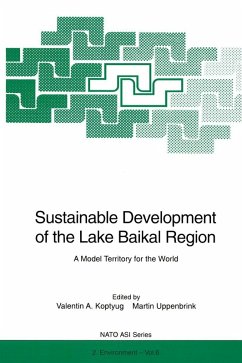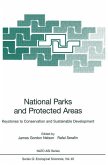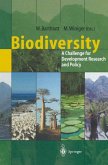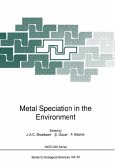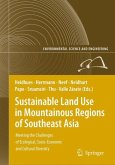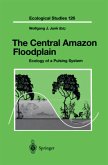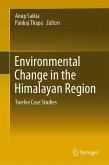Sustainable Development of the Lake Baikal Region
A Model Territory for the World
Herausgegeben von Koptyug, Valentin A.; Uppenbrink, Martin
Sustainable Development of the Lake Baikal Region
A Model Territory for the World
Herausgegeben von Koptyug, Valentin A.; Uppenbrink, Martin
- Broschiertes Buch
- Merkliste
- Auf die Merkliste
- Bewerten Bewerten
- Teilen
- Produkt teilen
- Produkterinnerung
- Produkterinnerung
Lake Baikal is the oldest, largest and deepest lake in the world. Its unique animal life and the beauty of the surrounding landscapes are renowned. The book discusses the sustainable development of the lake and its use as a model for the rest of the world. It consolidates existing data on the current state of the environment and economy of the region, develops a system of indicators of sustainable developments, makes recommendations on additional components to the existing monitoring system and considers a legal framework and instrument for its implementation.
Andere Kunden interessierten sich auch für
![National Parks and Protected Areas National Parks and Protected Areas]() National Parks and Protected Areas75,99 €
National Parks and Protected Areas75,99 €![Biodiversity Biodiversity]() Biodiversity115,99 €
Biodiversity115,99 €![Metal Speciation in the Environment Metal Speciation in the Environment]() Metal Speciation in the Environment115,99 €
Metal Speciation in the Environment115,99 €![Sustainable Land Use in Mountainous Regions of Southeast Asia Sustainable Land Use in Mountainous Regions of Southeast Asia]() Franz J. Heidhüs / Ludger Herrmann / Andreas Neef / Sybille Neidhart / Jens Pape / Pittaya Sruamsiri / Dao Chau Thu / Anne Vallé Zarate (eds.)Sustainable Land Use in Mountainous Regions of Southeast Asia149,99 €
Franz J. Heidhüs / Ludger Herrmann / Andreas Neef / Sybille Neidhart / Jens Pape / Pittaya Sruamsiri / Dao Chau Thu / Anne Vallé Zarate (eds.)Sustainable Land Use in Mountainous Regions of Southeast Asia149,99 €![The Central Amazon Floodplain The Central Amazon Floodplain]() The Central Amazon Floodplain223,99 €
The Central Amazon Floodplain223,99 €![Environmental Change in the Himalayan Region Environmental Change in the Himalayan Region]() Environmental Change in the Himalayan Region75,99 €
Environmental Change in the Himalayan Region75,99 €![Biological Soil Crusts: Structure, Function, and Management Biological Soil Crusts: Structure, Function, and Management]() BelnapBiological Soil Crusts: Structure, Function, and Management107,99 €
BelnapBiological Soil Crusts: Structure, Function, and Management107,99 €-
-
-
Lake Baikal is the oldest, largest and deepest lake in the world. Its unique animal life and the beauty of the surrounding landscapes are renowned.
The book discusses the sustainable development of the lake and its use as a model for the rest of the world. It consolidates existing data on the current state of the environment and economy of the region, develops a system of indicators of sustainable developments, makes recommendations on additional components to the existing monitoring system and considers a legal framework and instrument for its implementation.
The book discusses the sustainable development of the lake and its use as a model for the rest of the world. It consolidates existing data on the current state of the environment and economy of the region, develops a system of indicators of sustainable developments, makes recommendations on additional components to the existing monitoring system and considers a legal framework and instrument for its implementation.
Produktdetails
- Produktdetails
- Nato Science Partnership Subseries: 2 6
- Verlag: Springer / Springer Berlin Heidelberg / Springer, Berlin
- Artikelnr. des Verlages: 978-3-642-64839-7
- Softcover reprint of the original 1st edition 1996
- Seitenzahl: 388
- Erscheinungstermin: 14. Oktober 2011
- Englisch
- Abmessung: 235mm x 155mm x 21mm
- Gewicht: 587g
- ISBN-13: 9783642648397
- ISBN-10: 3642648398
- Artikelnr.: 36116540
- Herstellerkennzeichnung
- Springer-Verlag GmbH
- Tiergartenstr. 17
- 69121 Heidelberg
- ProductSafety@springernature.com
- Nato Science Partnership Subseries: 2 6
- Verlag: Springer / Springer Berlin Heidelberg / Springer, Berlin
- Artikelnr. des Verlages: 978-3-642-64839-7
- Softcover reprint of the original 1st edition 1996
- Seitenzahl: 388
- Erscheinungstermin: 14. Oktober 2011
- Englisch
- Abmessung: 235mm x 155mm x 21mm
- Gewicht: 587g
- ISBN-13: 9783642648397
- ISBN-10: 3642648398
- Artikelnr.: 36116540
- Herstellerkennzeichnung
- Springer-Verlag GmbH
- Tiergartenstr. 17
- 69121 Heidelberg
- ProductSafety@springernature.com
Introductory Address.- Welcome Address.- I. Sustainable Development: General Aspects, Requirements and Indicators.- Main Factors Necessitating Mankind's Transition to Sustainable Development.- Environment as a NATO Priority.- The Global Ecological Challenge: Two Years After the Rio Summit.- The Buddhist Perspectives of Sustainable Ecological Development.- Interaction Between Economics and the Environment from the Point of View of Sustainable Development.- Concepts in Nature Conservation for Sustainable Development.- A Proposal for a Set of Aggregated Indicators of the Environmental Dimension of Sustainability.- Economic Conditions and Requirements of Sustainable Development in General and for the Lake Baikal Region in Particular.- Influence of Enviromental Factors on the Health of the Population of the Lake Baikal Region.- II. Main Problems of the Lake Baikal Region Development and the Role of Science and Culture for Their Solution.- The Complex Federal Program for the Protection of Lake Baikal and Rational Use of Natural Resources in the Region: Mechanisms of the Program's Implementation.- The Role of the Irkutsk Region in Realizing Sustainable Development in the Lake Baikal Region.- Rational Branch and Territorial Structure of the Economy of the Republic of Buryatia.- Perspectives of Development of the Selenga River Basin in the Territory of Mongolia.- Characteristics of the Sustainable-development Model for the Outlying and Contact Zones of the Lake Baikal Basin.- Energy: World Trends, the Situation in the Russian Federation and Siberia, Recommendations on Sustainable Development of the Lake Baikal Region.- Mineral Resources of the Lake Baikal Region and Sustainable Development.- Ecological Modernization of Industrial Production.- "Castling": A Possibility ofPartial Reorganization of the Economy of the Baikal Region for the Sake of Sustainable Development.- Problems of Sustainable Development of the Agricultural Complex in the Lake Baikal Region.- Ecological Modernization of Agriculture.- The Role of Scientists in Developing Sustainable Land Use in the Lake Baikal Region.- Forest Resources of the Lake Baikal Region and Perspectives of Their Industrial Exploitation.- Informational and Cartographic Support of Sustainable Development in the Lake Baikal Region.- Ecologo-Economic Models of the Lake Baikal Region Development.- Sustainable Development and Tourism. Ecotourism: A Popular Slogan or a Powerful Tool?.- The International Sector and Sustainable Development in the Lake Baikal Region.- Combining Ecological and Social Studies in the Comparative Study of Pastoralism in Inner Asia.- Preservation of the Folklore Monuments and Endangered Languages as a Major Factor of World Culture.- III. Legislative and Administrative Support of Sustainable Development.- International Conventions - Tools for Sustainability.- Participation of the Local Population in Area Protection.- Considerations Regarding Nominating Lake Baikal as a World Heritage Site.- Sustainable Development Within Area Protection and Management of National Parks.- Political and Legal Base for Nature Protection in a Federalist System.- Legislating Sustainable Development: People, Politics and Process.- The Federal Law on Lake Baikal as a Legislative Basis for Sustainable Development of the Lake Baikal Region.- Principles and Conditions for Implementation of the Sustainable-development Programmes of the Lake Baikal Region.- IV. Statement.- English.- Russian.- List of Workshop Participants.
Introductory Address.- Welcome Address.- I. Sustainable Development: General Aspects, Requirements and Indicators.- Main Factors Necessitating Mankind's Transition to Sustainable Development.- Environment as a NATO Priority.- The Global Ecological Challenge: Two Years After the Rio Summit.- The Buddhist Perspectives of Sustainable Ecological Development.- Interaction Between Economics and the Environment from the Point of View of Sustainable Development.- Concepts in Nature Conservation for Sustainable Development.- A Proposal for a Set of Aggregated Indicators of the Environmental Dimension of Sustainability.- Economic Conditions and Requirements of Sustainable Development in General and for the Lake Baikal Region in Particular.- Influence of Enviromental Factors on the Health of the Population of the Lake Baikal Region.- II. Main Problems of the Lake Baikal Region Development and the Role of Science and Culture for Their Solution.- The Complex Federal Program for the Protection of Lake Baikal and Rational Use of Natural Resources in the Region: Mechanisms of the Program's Implementation.- The Role of the Irkutsk Region in Realizing Sustainable Development in the Lake Baikal Region.- Rational Branch and Territorial Structure of the Economy of the Republic of Buryatia.- Perspectives of Development of the Selenga River Basin in the Territory of Mongolia.- Characteristics of the Sustainable-development Model for the Outlying and Contact Zones of the Lake Baikal Basin.- Energy: World Trends, the Situation in the Russian Federation and Siberia, Recommendations on Sustainable Development of the Lake Baikal Region.- Mineral Resources of the Lake Baikal Region and Sustainable Development.- Ecological Modernization of Industrial Production.- "Castling": A Possibility ofPartial Reorganization of the Economy of the Baikal Region for the Sake of Sustainable Development.- Problems of Sustainable Development of the Agricultural Complex in the Lake Baikal Region.- Ecological Modernization of Agriculture.- The Role of Scientists in Developing Sustainable Land Use in the Lake Baikal Region.- Forest Resources of the Lake Baikal Region and Perspectives of Their Industrial Exploitation.- Informational and Cartographic Support of Sustainable Development in the Lake Baikal Region.- Ecologo-Economic Models of the Lake Baikal Region Development.- Sustainable Development and Tourism. Ecotourism: A Popular Slogan or a Powerful Tool?.- The International Sector and Sustainable Development in the Lake Baikal Region.- Combining Ecological and Social Studies in the Comparative Study of Pastoralism in Inner Asia.- Preservation of the Folklore Monuments and Endangered Languages as a Major Factor of World Culture.- III. Legislative and Administrative Support of Sustainable Development.- International Conventions - Tools for Sustainability.- Participation of the Local Population in Area Protection.- Considerations Regarding Nominating Lake Baikal as a World Heritage Site.- Sustainable Development Within Area Protection and Management of National Parks.- Political and Legal Base for Nature Protection in a Federalist System.- Legislating Sustainable Development: People, Politics and Process.- The Federal Law on Lake Baikal as a Legislative Basis for Sustainable Development of the Lake Baikal Region.- Principles and Conditions for Implementation of the Sustainable-development Programmes of the Lake Baikal Region.- IV. Statement.- English.- Russian.- List of Workshop Participants.

